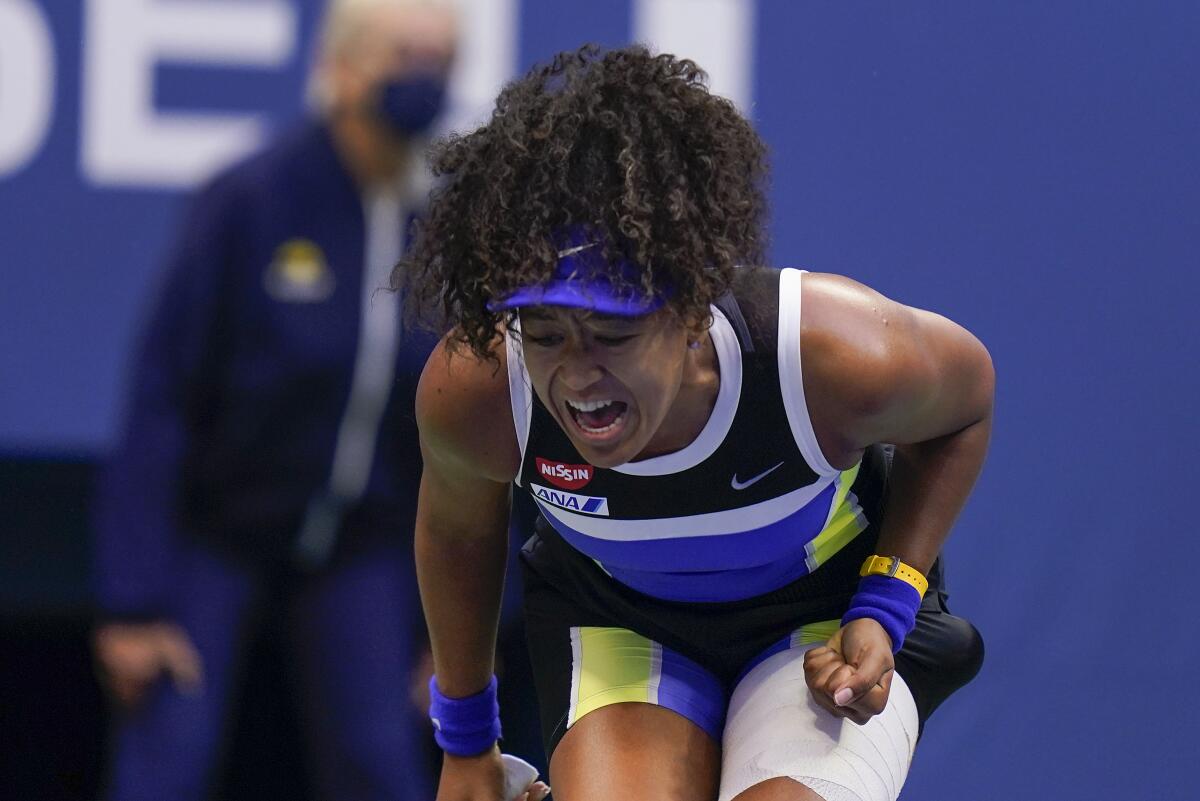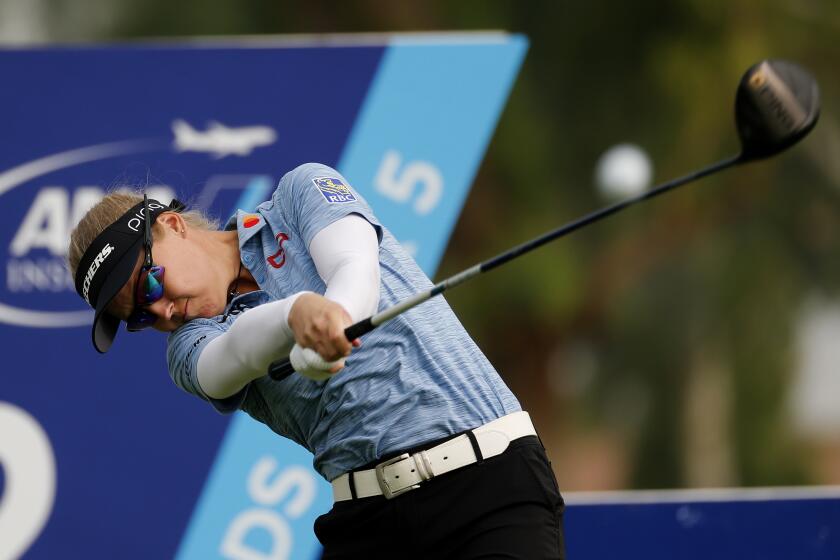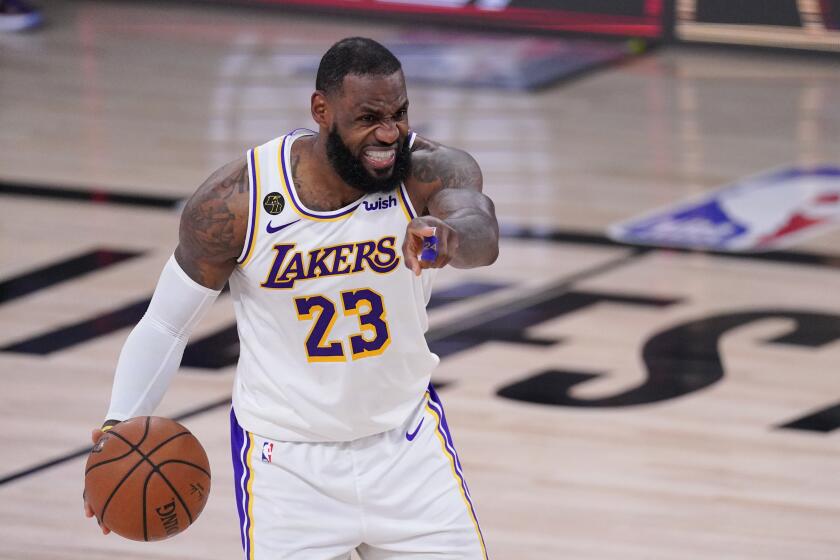Naomi Osaka wins second U.S. Open title and likes view at the top

- Share via
Naomi Osaka chose a spot and carefully lowered herself to the court at Arthur Ashe Stadium, settling onto her back to stare upward at nothing and everything.
Precautions dictated by the COVID-19 pandemic meant there were no fans to serenade her after she staged a stirring comeback to defeat Victoria Azarenka in the U.S. Open women’s final, but Osaka wasn’t going to miss out on the full championship experience. She had earned it.
“I was thinking about all the times I’ve watched great players sort of collapse onto the ground and look up into the sky. I’ve always wanted to see what they saw,” she said. “For me, it was really an incredible moment. I’m really glad I did it.”
When she arose, she stood as a two-time U.S. Open singles champion and three-time Grand Slam singles winner on the strength of her 1-6, 6-3, 6-3 triumph over two-time Slam winner Azarenka on Saturday at New York. The last time a woman came back from a set down in the final at Flushing Meadows to win the title occurred when Arantxa Sanchez Vicario came back to defeat Steffi Graf in 1994, three years before Osaka was born.
Brooke Henderson matched a Mission Hills record with a front-nine 30 and shot a seven-under 65 to move into a tie for the lead with Nelly Korda.
It’s that rare because it’s that difficult, but Osaka is rare too. Two years after she was jeered by fans who believed Serena Williams had been wronged by the chair umpire during their U.S. Open final and Osaka needlessly apologized for winning, she’s stronger and more secure as a person and as a tennis player.
Over the last two weeks she upheld her commitment to her sport and her commitment to social justice, carrying out the latter by wearing to each of her matches a mask that bore the name of a person killed in what she recently called “continued genocide of Black people at the hands of police.” Osaka, whose mother is Japanese and whose father is Haitian, has participated in peaceful demonstrations in Los Angeles — her new home — and in Minneapolis, where George Floyd died in police custody in May. “I feel like the point is to make people start talking,” she said of the masks.
Despite a hamstring injury she sustained during a pre-Open tournament, Osaka won a trio of three-set matches to reach the final. To get to a third set Saturday she had endure a 27-minute first-set thrashing from Azarenka, now a three-time runnerup in New York. Osaka also fought off a third-set pushback from Belarus native Azarenka, who is soaring back toward the top of the rankings after giving birth to her son in 2016 and curtailing her schedule due to a custody dispute over the boy.
“I feel like two years ago I maybe would have folded being down a set and a break,” Osaka said. “But I think all the matches that I played in between that time shaped me and made me or forced me to mature more. Especially all the matches that I’ve played here were very tough. ... I’m more of a complete player now.”
This U.S. Open has been notable for what it lacked. It lost the trademark zesty energy generated by New York crowds and it lost many top-ranked women’s players for reasons either personal or related to pandemic-era travel. Osaka, Azarenka, semifinalists Williams and Jennifer Brady and other women made it notable for good things, for their struggles and triumphs as they pushed through the odd circumstances created by the pandemic bubble.
Azarenka, 31, appeared on the verge of earning her first Grand Slam singles title since the 2013 Australian Open when she played a near-flawless first set and carried that over to earn a break in the second game of the second set. “I just thought to myself to be positive, don’t lose 6-1, 6-0, hopefully give her a slight run for her money,” Osaka said.
Osaka found her range with her forehand and got steadier on her powerful serve and broke Azarenka’s serve in the third game and again in the seventh game, to go up 4-3. She won the second set on her second try, on a forehand. “She started to play better,” said Azarenka, whose runnerup check of $1.5 million is half of Osaka’s prize. “Caught a few lines, had some really good shots. She was being really aggressive.”
LeBron James had 29 points and 11 rebounds in a 119-96 win over the Rockets to lead the Lakers into the Western Conference finals for the first time in 10 years.
Osaka rolled to a 4-1 lead in the third set and had four break points in the sixth game for 5-1 but Azarenka fought back and won it with an ace. Azarenka got a break in the seventh game to cut Osaka’s lead to 4-3 but Osaka broke back. She won on her second championship point. “She’s a pretty impressive player,” said Azarenka, who planned to fly to Italy on Sunday for a clay court tournament before the rescheduled French Open. “I mean, she’s a U.S. Open champion. What else can you say?”
Osaka, who will be 23 next month, is building an impressive resume and positioning herself as a leader for years to come in the women’s game. “I feel like I’ve definitely tried to mature,” she said. “I wasn’t really sure the process that I was going to have to take. But I feel like the lessons that I learned with life definitely developed me as a person more.”
As a result, she saw what those champions before her had seen when they looked skyward at Arthur Ashe Stadium.
Elliott reported from Los Angeles .
More to Read
Go beyond the scoreboard
Get the latest on L.A.'s teams in the daily Sports Report newsletter.
You may occasionally receive promotional content from the Los Angeles Times.













